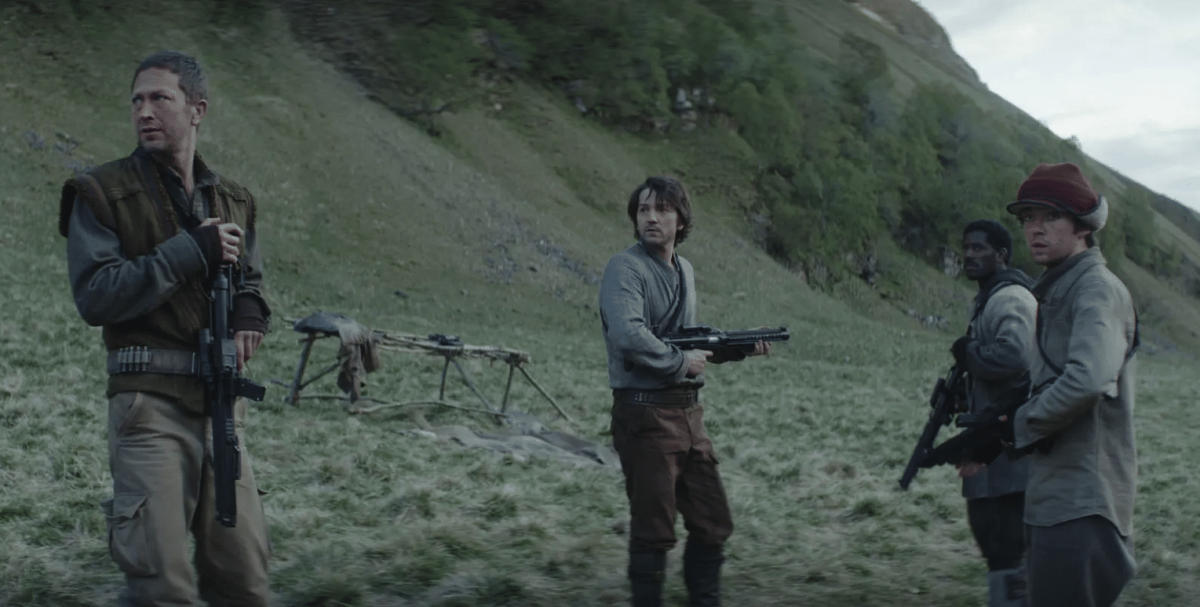The reviews are unanimous: Andor is brilliant. It’s tempting to say Andor is ‘not just good for Star Wars,’ or ‘not just good for a streaming show,’ or ‘not just good for a Rogue One prequel’ – these are key to its strengths. I’m sure it’s an enjoyable watch as a standalone show, but there’s immense depth from understanding it in harmony with a sprawling franchise.
Andor is an opportunity to re-examine the term ‘fan service.’ Usually pejorative, it’s used to describe a number of storytelling choices. Fan service can be an entire series – Andor is a prequel to a prequel about a character unrelated to the overarching ‘Skywalker Saga.’
It can be ‘easter eggs’ in the form of cameos and shout-outs to other instalments of the franchise. It can also be used to refer to clichéd character arcs, such as couples getting together or characters being implausibly badass. Usually when someone says ‘fan service,’ they’re not the fan in question. It frames the storyteller-consumer dynamic as antagonistic, as if writers have lost control of the narrative and the slavering mob doesn’t know what they really want.
When showrunners deliberately avoid fan service, it can be just as harmful. This means derailing story arcs because too many people have correctly anticipated a foreshadowed twist, or killing off beloved characters as a ‘gotcha’. This approach implies a narrative would be purer if nobody engaged with it, especially not deeply. Either way, fans are seen as ruining a story by enjoying it too much.
The truth is, Andor plays out like good fanfiction. Usually accusations of fanfiction mean a story is too self-indulgent, saccharine, or deviates wildly from the source material. But Rogue One and Andor do exactly what the best fanfiction does: it finds a gap in the narrative and fills it with something that changes the context of the surface story.
Read: Andor, Disney+ review: believe the hype, it’s amazing
Rogue One took a throwaway line from the first film about how the Rebels got the Death Star plans and asked: ‘How did that happen? What did it cost?’ The film is widely regarded as the best iteration of Star Wars, treating revolution and sacrifice with the weight they deserve. It introduced a diverse ensemble of characters – Cassian Andor included – who didn’t have Jedi powers or a great cosmic destiny. They were ordinary people who didn’t live to see if they’d succeeded.
In spite of this, Rogue One staked the claim that they mattered, and Andor continues to ask: ‘How did the leader of Rogue One get there? Why does he still matter?’
Life under a fascist regime
Andor loves Star Wars like Star Wars fans love Star Wars. Andor is the first Disney show to take the galaxy seriously: to unflinchingly examine the implications of life under a fascist regime, and to value minor details the way fans always have.
There are no gimmicky cameos: instead, Andor values its fans by refusing to take their beloved galaxy at face value. The Empire is not evil because its villains wear black: the Empire exploits prison labour, racially profiles its subjects, and commits cultural genocide. When Luke Skywalker destroyed the Death Star, it was only possible because a thousand previously-nameless characters laid down their lives pushing the Empire to its limit.
It introduces an ensemble of characters who are more than walk-on roles: they grow and change over the long arc of twelve episodes. From police brutality to planned obsolescence, Andor offers social allegories deeper than anything you see in Star Wars, or any Disney fare. It tests the strength of the world-building by putting immense pressure on the breaking points. This positions the show to represent issues including institutional sexism and union organising, relying on the weight of real-world historical struggles without cheapening them through science fiction.
All killer
At 12 episodes, this arc is significantly longer than other live-action Star Wars stories. Still, it doesn’t sprawl or pack in filler episodes: the writers take time to follow up on character developments and dwell on the ramifications of serious events. The story beats are tidily paced, comparable with broadcast television: the episodes chart an inciting cat-and-mouse game to a heist caper, then a prison break culminating in a public riot.
Still, the adventures are never rushed. Death is never cheap – although many have noted that Black characters die unusually fast. It’s the kind of casting choice that could have easily been averted, and an unusual oversight in a show otherwise so well-crafted.
While Diego Luna’s nuanced performance holds the heart of the story, supporting actors such as Fiona Shaw, Stellan Skårsgard, Andy Serkis, and Genevieve O’Reilly are at their best. They round out the story with an intricate web of connections: politicians, spies, thieves, and musicians are equally vital to building the coming Rebellion. The narrative puts immense faith in audiences to infer the complexity and the urgency of organising a regime change.
Every action is consequential, which gives the show itself consequence. Andor treats Star Wars as capable of depth and worthy of love. Fans always knew it was, and their devotion has finally paid off.
Andor is currently streaming on Disney+





